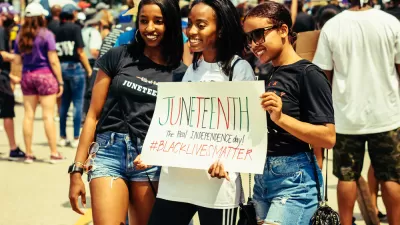Conservatives and liberals tend to define "racism" very differently. As a result, accusations of racism tend to be unsuccessful outside ideologically homogenous environments.

A few months ago, racial divisions received intense media coverage when a white police officer shot an unarmed black youth in Ferguson, Missouri, leading to demonstrations, rioting, and a rather aggressive police response.
But race is also an issue in land use politics; for example, zoning that excludes lower-income people from a neighborhood or city tends to disproportionately harm some racial minorities, as do transportation policies that favor (mostly white) drivers and train riders over (mostly black and Hispanic) bus riders. Opponents of such policies occasionally accuse government of racism—but such charges rarely lead to policy changes. Why?
One reason might be the term "racism" no longer has a commonly accepted definition—so unless a government policy is "racist" by the narrowest possible definition of the term, it will rarely receive the sort of universal condemnation that is required for significant reform.
One common view, generally held by political conservatives, is based on irrationality: that racism is irrational discrimination, and that to be racist, a statement or policy must involve explicit discrimination or race hatred. Under this view, laws that completely ignore individual behavior, such as Jim Crow laws, are racist, while unfair yet arguably rational laws are not. So even most Tea Party types believe that a police officer who arrests every black person he sees is a racist, or that a restrictive covenant that forbade blacks from buying a house in a subdivision would also be racist. Because very few Americans support such explicit discrimination, even the most conservative states and Congressional districts are usually willing to vote for ideologically compatible politicians of any race. For example, black conservative Republicans now hold a Senate seat in South Carolina and a couple of House seats as well.
However, many people who voted for these politicians may support policies that tend to favor whites over other Americans, as long as those policies (a) help (or at least fail to harm) at least a few members of racial minorities and (b) are otherwise rational. For example, someone who views racism as irrationality is unlikely to view exclusionary zoning designed to keep out low-income people as racist, because a few blacks and Hispanics can afford a neighborhood with high property values.
A broader definition of racism, by contrast, is based on unfairness—the idea that a rule of policy that unfairly and disproportionately harms racial minorities is racist. A person defining racism this way might see exclusionary zoning as racist, if the people thereby excluded from a neighborhood are especially likely to be members of racial minorities.
It seems to me that the "racism as unfairness" view, generally held by political liberals, is partially based on the "Golden Rule" principle: if a statement or policy would make you uncomfortable if it hurt or criticized your own group, it should be treated as offensive. To use an example outside land use: during the Trayvon Martin affair and the Ferguson affair (in which whites shot unarmed black youths in the course of a scuffle of some sort, creating a considerable public outcry) I noticed that many of my more right-wing white friends tried to minimize the matter, either by emphasizing the white shooter’s side of the story or by claiming that intraracial crimes receive much less publicity (especially if the perpetrator and victim are black). There was nothing racist about this under a "racism as irrationality" view, since in fact African-Americans are disproportionately likely to be arrested for (and to be victimized by) such crimes, and the facts of both situations were somewhat ambiguous. On the other hand, when I put on my "Golden Rule hat," I was a bit more troubled; it occurred to me that if, every time an attack upon Jews received national publicity, someone argued that the Jew had provoked an attack, or tried to distract attention by pointing out that there are Jewish murderers here and there, such statements might seem a bit bigoted.
The "Golden Rule" principle can also be applied to transportation or land use policy: for instance, if blacks are more likely than whites to not have cars, and a city’s transportation policy seems designed to limit the options of persons without cars, someone adhering to the “Golden Rule” principle might think: if there was a law that hurt my group more than other groups, I would think that’s a racist law even if it is technically color-blind.
Which definition is right? It seems to me that the English language is a creation of people rather than a mandate from Heaven, so there is no objectively correct definition of racism. As a result, there is no end of argument about such matters. Perhaps a better question is: which definition is more likely to create the kind of nation we want to live in?

Trump Administration Could Effectively End Housing Voucher Program
Federal officials are eyeing major cuts to the Section 8 program that helps millions of low-income households pay rent.

Planetizen Federal Action Tracker
A weekly monitor of how Trump’s orders and actions are impacting planners and planning in America.

Ken Jennings Launches Transit Web Series
The Jeopardy champ wants you to ride public transit.

California Invests Additional $5M in Electric School Buses
The state wants to electrify all of its school bus fleets by 2035.

Austin Launches $2M Homelessness Prevention Fund
A new grant program from the city’s Homeless Strategy Office will fund rental assistance and supportive services.

Alabama School Forestry Initiative Brings Trees to Schoolyards
Trees can improve physical and mental health for students and commnity members.
Urban Design for Planners 1: Software Tools
This six-course series explores essential urban design concepts using open source software and equips planners with the tools they need to participate fully in the urban design process.
Planning for Universal Design
Learn the tools for implementing Universal Design in planning regulations.
Ada County Highway District
Clanton & Associates, Inc.
Jessamine County Fiscal Court
Institute for Housing and Urban Development Studies (IHS)
City of Grandview
Harvard GSD Executive Education
Toledo-Lucas County Plan Commissions
Salt Lake City
NYU Wagner Graduate School of Public Service






























